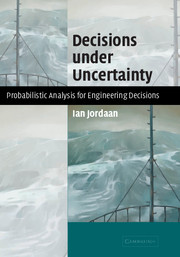Book contents
- Frontmatter
- Contents
- List of illustrations
- Preface
- Acknowledgements
- 1 Uncertainty and decision-making
- 2 The concept of probability
- 3 Probability distributions, expectation and prevision
- 4 The concept of utility
- 5 Games and optimization
- 6 Entropy
- 7 Characteristic functions, transformed and limiting distributions
- 8 Exchangeability and inference
- 9 Extremes
- 10 Risk, safety and reliability
- 11 Data and simulation
- 12 Conclusion
- Appendix 1 Common probability distributions
- Appendix 2 Mathematical aspects
- Appendix 3 Answers and comments on exercises
- References
- Index
3 - Probability distributions, expectation and prevision
Published online by Cambridge University Press: 05 June 2012
- Frontmatter
- Contents
- List of illustrations
- Preface
- Acknowledgements
- 1 Uncertainty and decision-making
- 2 The concept of probability
- 3 Probability distributions, expectation and prevision
- 4 The concept of utility
- 5 Games and optimization
- 6 Entropy
- 7 Characteristic functions, transformed and limiting distributions
- 8 Exchangeability and inference
- 9 Extremes
- 10 Risk, safety and reliability
- 11 Data and simulation
- 12 Conclusion
- Appendix 1 Common probability distributions
- Appendix 2 Mathematical aspects
- Appendix 3 Answers and comments on exercises
- References
- Index
Summary
Bring out number, weight and measure in a year of dearth.
William Blake, Proverbs of HellProbability distributions
We are now in the following situation. We have a probability mass of unity, and we wish to distribute this over the possible outcomes of events and quantities of interest. We also wish to manipulate the results to assist in decision-making. We have so far considered mainly random events, which may take the value 0 or 1. A common idealized example that we have given is that of red and pink balls in an urn, which we have labelled 1 and 0, respectively. Thus, the statement E = ‘the ball drawn from the urn is red’ becomes E = 0 or E = 1, depending on whether we draw a pink or red ball. The event E either happens or it does not, and there are only two possible outcomes. Random quantities can have more than two outcomes. For the case of drawings from an urn, the random quantity could be the number of red balls in ten (or any other number) of drawings, for example from Raiffa's urns of Figure 2.10. A further example is the throwing of a die which can result in six possible outcomes; the drawing of a card from a deck can result in 52 possible outcomes, and so on.
Information
- Type
- Chapter
- Information
- Decisions under UncertaintyProbabilistic Analysis for Engineering Decisions, pp. 90 - 161Publisher: Cambridge University PressPrint publication year: 2005
